It’s not an easy choice for retirees hitting 65: Do you stay with traditional Medicare or choose Medicare Advantage?
Since Medicare doesn’t cover everything, Advantage plans often cover more, but with lower or no premiums. There’s always a catch, though. Nothing is entirely free. Advantage plans, offered by private insurers, restrict which health care providers they will cover.
According to a recent report by the Center for Retirement Research (CRRC), you need to weigh the pros and cons of each plan carefully.
“Advantage plans are complete insurance policies that operate much like employer health plans with copayments and deductibles,” writes Kim Blanton for CRRC. “They have been heavily criticized for becoming increasingly profitable and costly for the federal Medicare program, which reimburses insurers for retirees’ care.”
How do you make the right choice that works best for you? Here’s what Blanton and other experts suggest:
How is Your Health? “Advantage plans “are great if you’re healthy,” Dr. Edward Hoffer in Boston commented in a recent blog. “They often offer extra benefits such as dental coverage or gym memberships. Be wary if you are ill, as they offer limited access to top hospitals and specialists.”
How Much Can You Pay Out of Pocket? “Many Advantage policies have zero premiums, which are a big selling point. The other option is Medigap, which rarely puts limits on where retirees can go for care – but has much higher monthly premiums than Advantage policies.”
Do You Need the Extra Coverage and Insurance? “Unlike Advantage insurance policies, Medigap is an add-on to traditional Medicare and covers the medical bills that Medicare does not. Medigap not only has higher premiums than Advantage plans but retirees, in all but a few states – Minnesota is one – have to buy a separate Part D plan to cover their prescription drugs. Despite the upfront additional costs, some studies show that Medigap plans may have lower out-of-pocket costs over the long run, though the evidence isn’t compelling.”
How do you work through the decision making process? Ask someone you know whom you trust who has signed up for Medicare. Local areas on aging also have Medicare counselors.
A note of caution: Avoid Medicare “consultants” sponsored by insurance companies, health care systems and financial brokers. They are more interested in selling a product on commission and won’t give you unbiased advice.
Read the full article here
